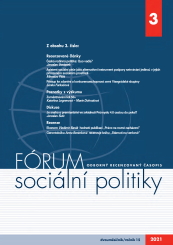Přístup ke zdanění a konkurenceschopnost zemí Visegrádské skupiny
The approach to taxation and competitiveness in the Visegrad Group countries
Author(s): Lenka FarkačováSubject(s): Economic policy
Published by: Výzkumný ústav práce a sociálních věcí
Keywords: competitiveness;Visegrad Group;taxes;digital agenda;
Summary/Abstract: The paper aims to determine which of the Visegrad Group countries has the most favourable tax environment for businesses. The assumption is that a friendly business environment is the starting point for the support of business activities and leads to the achievement of international competitiveness. The MCDA method is used to achieve this aim. The four analysed countries are compared applying a set of quantitative evaluation criteria, i.e. the tax burden and settlement convenience; the quality of the administration of the tax system; GDP; remuneration for work and the level of corruption. According to the methodology, Hungary appears to be the most favourable tax environment for businesses. At the same time, it can be stated that, in the broader context of the comparison of the selected factors across all EU countries, the Visegrad Group countries are, in many respects, similar, particularly with respect to the level of corruption and the remuneration for work. It is also necessary to draw attention to the disadvantages of the openness of such business environments. For instance, the low level of the cost of human labour may lead to the prioritisation of human labour over the development and application of technologically-innovative business approaches.
Journal: Fórum sociální politiky
- Issue Year: 2021
- Issue No: 3
- Page Range: 20-25
- Page Count: 6
- Language: Czech

